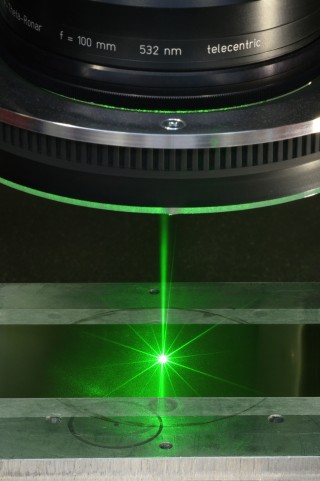10.7.2017
Cost efficiency coupled with high productivity without any adverse impact on the environment: As part of the EU “PoLaRoll” Project, the Fraunhofer Institute for Production Technology IPT in Aachen is collaborating with the Fraunhofer Institute for Environmental, Safety and Energy Technology UMSICHT in Oberhausen and with partners from industry to develop a module capable of direct laser micro-structuring in a roll-to-roll process. The aim is to produce a sieve-like metal foil to serve as a demonstrator which will be used to protect glass facades from the effects of the sun: their special geometry will lower the impact of solar radiation, thereby reducing the amount of energy required in order to cool and ventilate the building.
Within the “PoLaRoll” project, the Fraunhofer IPT is responsible for developing the laser structuring process as well as for the measuring and systems engineering. In addition to this, the industrial partners will refine two pivotal components: a femtosecond laser with high power output coupled with an extremely high pulse repetition rate and an innovative, dual polygon scanner system, whose purpose will be to ensure swift and accurate beam deflection. The Fraunhofer UMSICHT is developing a new, chromate-free, environmentally-compatible coating which will be cured via UV-lithography. It will ultimately be possible to structure both sides of the metal foil simultaneously using a laser.
In order to ensure the highest possible structuring precision in conjunction with maximum manufacturing throughput, the Fraunhofer IPT is currently developing an inline measuring system for the polygon-scanner. This will permit the removal of coating via the ultra-short pulsed laser to be measured and any processing faults in the material to be measured in real time along with the form and position of the micro-structures. The Fraunhofer IPT will additionally develop a system-based solution which will permit high-speed synchronization of the laser source and the polygon scanner, allowing the beam path to be split, for example, and moved in both directions.
To conclude the project, it is anticipated that the new module with its ultra-short pulsed laser and the polygon scanner system will be integrated in a roll-to-roll process chain to bring together new, interdisciplinary developments from industry and research. These, in turn, will be integrated within a high-speed structuring operation using a pulsed laser to achieve efficient, environmentally compatible industrial high-volume manufacture.
Roll-to-roll processes are ideally suited to the rapid, cost-effective manufacture of electronic parts and have long been involved in electrical engineering, micro-production and solar technology. Whereas conventional and other laser-based manufacturing processes have already been successfully incorporated in roll-to-roll manufacturing, attempts to integrate direct structuring operations conducted using pulsed lasers have so far met with little success. Until now, the failings of these processes have been the inadequate repetition frequency and low pulse energy of the laser as well as the lack of speed and precision of the beam deflection. It is anticipated that these shortcomings will be eliminated within the framework of the “PoLaRoll” project.
Funding – The project, with the funding ID 723805, will be funded to the tune of 3.5 million Euro in the period from October 2016 until September 2019 as part of the European Union “Horizon 2020” Programme. The total cost is expected to amount to approximately 4.4 million Euro.
Participating research institutes
- Fraunhofer Institute for Production Technology IPT, Aachen
- Fraunhofer Institute for Environmental, Safety and Energy Technology UMSICHT, Oberhausen
Participating industrial partners
- Amplitude Systèmes, France
- D’Appolonia S.P.A., Italy
- Laser Engineering Applications SA, Belgium
- LUNOVU Integrated Laser Solutions GmbH, Germany
- Micrometal GmbH, Deutschland, Germany
- Next Scan Technology, Belgium












